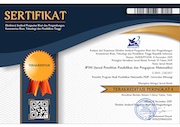Peningkatan kemampuan pemecahan masalah, berpikir kreatif dan self-confidence siswa melalui model pembelajaran berbasis masalah
Abstract
This study aimed to investigate: (1) the differences in the achievement and improvement of student’s mathematical problem solving between problem-based learning class and scientific approach class; (2) the differences in the improvement of student’s mathematical problem solving between problem-based learning class and scientific approach class; (3) the differences in the achievement and improvement of student’s mathematical creative thinking between problem-based learning class and scientific approach class; (4) the differences in the improvement of student’s mathematical creative thinking between problem-based learning class and scientific approach class; (5) the differences in student’s self-confidence between problem-based learning class and scientific approach class. This research was a quasi-experimental research through problem-based learning approach and scientific approach. The population of the study were all students of class X in one of SMK in Bandung and two classes were taken as the sample. The research instruments used were the problem-solving test, mathematical creative thinking tests and self-confidence questionnaires. The results showed that there were differences in the achievement and improvement of student’s problem-solving skills, mathematical creative thinking and self-confidence in both class groups experiments.
Full Text:
view PDFReferences
Amien, M. (1987). Peranan kreativitas dalam pendidikan. Analisis Pendidikan. Jakarta: Depdikbud.
Amir, M. Taufik. (2010). Inovasi pendidikan melalui Problem Based Learning: Bagaimana pendidik memberdayakan pembelajaran di era pengetahuan. Jakarta: Prenada Media Grup.
Fauziah, Y. N. (2011). Analisis kemampuan guru dalam mengembangkan keterampilan berpikir kreatif siswa Sekolah Dasar V pada pembelajaran Ilmu Pengetahuan Alam. [Online]. Tersedia di http://jurnal.upi.edu/file/11-Yuli_Nurul-Edit.pdf. Diakses 10 Oktober 2013.
Fahrurrazi. (2011). Penerapan pembelajaran berbasis masalah untuk meningkatkan kemampuan berpikir kritis dan komunikasi matematis siswa Sekolah Dasar. [Online]. Tersedia: http//Jurnal.Upi.Edu/File/8-Fahrurrazi.Pdf. Diakses 16 November 2012.
Hake, R. R. (1999). Analyzing Change/ Gain Scores. [Online]. Tersedia di http://www.physics.indiana.edu/~sdi/AnalyzingChange-Gain.pdf. Diakses 19 Desember 2014.
Hosnan. (2014). Pendekatan saintifik dan kontekstual dalam pembelajaran abad 21. Bogor: Ghalia Indonesia.
Ismaimuza. (2010). Kemampuan berpikir kritis dan kreatif matematis siswa SMP melalui pembelajaran berbasis masalah dengan strategi konflik kognitif. Disertasi pada PPS UPI: Tidak diterbitkan.
Kemdikbud. (2013). Pendekatan Scientific (Ilmiah) dalam Pembelajaran. Jakarta: Pusbangprodik
Kemdikbud. (2013). Problem based learning. Jakarta: Kemendikbud.
Krutetskii, V. A. (1976). The psychology of mathematical abilities in school children. Chicago: University of Chicago Press. [Online]. (http://tatagyes.files.wordpress.com/2009/11/paper07jurnalpgriyogya.pdf. Diakses tanggal 15 Februari 2011.
Made, Wena. (2009). Strategi pembelajaran inovatif kontemporer. Jakarta: Bumi Aksara.
Middleton, J dan Spanias, P. (1999). “Motivation for achievement in mathematics: findings, generalization, and criticms of the researchâ€. Journal for Research in Mathematics Education. Vol. 30, No.1, 65-88.
Pehkonen, E. (1997). The state-of-art in mathematical creativity. ZDM Zentralblatt fur Didaktik der Mathematik: International Reviews on Mathematical Education, 29(3), hlm. 63-67.
Polya. (1985). How to solve it. It an new aspect of mathematical method. Second edition. New Jersey: Princeton University Press.
PPPPTK. (2011). Instrumen penilaian hasil belajar matematika SMP. Belajar dari PISA dan TIMSS.
Preston, D. L. (2007). 365 steps to self confidence. ISBN: 978 1 84803 210: Oxford OX5 1RX.
Rohayati, I. (2011). Program bimbingan sebaya untuk meningkatkan percaya diri siswa. Jurnal UPI, Edisi Khusus. [Online]. Tersedia : http://jurnal.upi.edu. Diakses 23 November 2014.
Ruseffendi, E. T. (1990). Pengajaran matematika modern dan masa kini untuk guru dan PGSD D2. Seri kelima. Bandung: Tarsito.
Ruseffendi, E. T. (2010). Dasar-dasar penelitian pendidikan & bidang non eksakta lainnya. Bandung: Tarsito..
Silver, E. A. (1997). Fostering craetivity through instruction rich in mathematical problem solving and problem posing. Tersedia: http://www.fizkarsruhe.de/fiz/publications/zdm/2dm97343.pdf. Diakses 23 Maret 2011.
Sudrajat, D. (2008). Program pengembangan Self Efficacy bagi konselor di SMA Negeri se kota Bandung. Tesis UPI: Tidak diterbitkan.
Suhardita, K. (2011). Efektifitas penggunaan teknik permainan dalam bimbingan kelompok untuk meningkatkan percaya diri siswa. Jurnal UPI, Edisi Khusus No.1, Agustus 2011, ISSN: 1412 565X.
Suherman, E. (2003). Evaluasi pembelajaran matematika. Edisi revisi. Common textbook. Universitas Pendidikan Indonesia.
Sumarmo, U. (2013). Berpikir dan disposisi matematik serta pembelajarannya. Kumpulam makalah. FMIPA UPI. Bandung: Diterbitkan.
Sutisna. (2010). Kelebihan dan kelemahan pembelajaran dengan pendekatan Problem Posing. [Online]. Tersedia: Http://sutisna.com/artikel/artikel-kependidikan/kelebihan-dan-kelemahan-pembelajaran-dengan-pendekatan-problem-posing.html. Diakses 10 Oktober 2011.
Tarrow, N. B. dan Lundsteen. (1978). Guiding young children learning. New York: Mc Gra-Hill Book Company.
Wahyudin. (1999). Kemampuan guru matematika, calon guru matematika dan siswa dalam mata pelajaran matematika (Disertasi). Bandung: UPI.
DOI: https://doi.org/10.37058/jp3m.v2i2.166
Refbacks
- There are currently no refbacks.
©2017 JP3M (Jurnal Penelitian Pendidikan dan Pengajaran Matematika)
Program Studi Pendidikan Matematika
Fakultas Keguruan dan Ilmu PendidikanÂ
Universitas Siliwangi
Jl. Siliwangi No. 24 Kota Tasikmalaya - 46115
email: jp3m@unsil.ac.id
e-ISSN: 2581-2807 ; p-ISSN: 2460-8599

This work is licensed under a Creative Commons Attribution-NonCommercial-ShareAlike 4.0 International License.
StatCounter:
Detail


